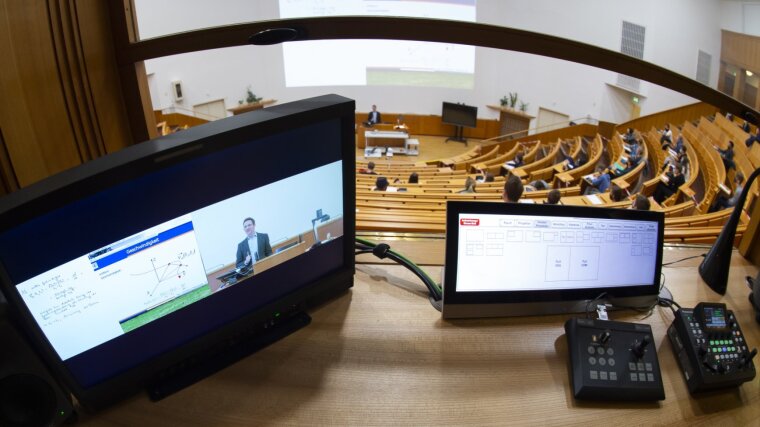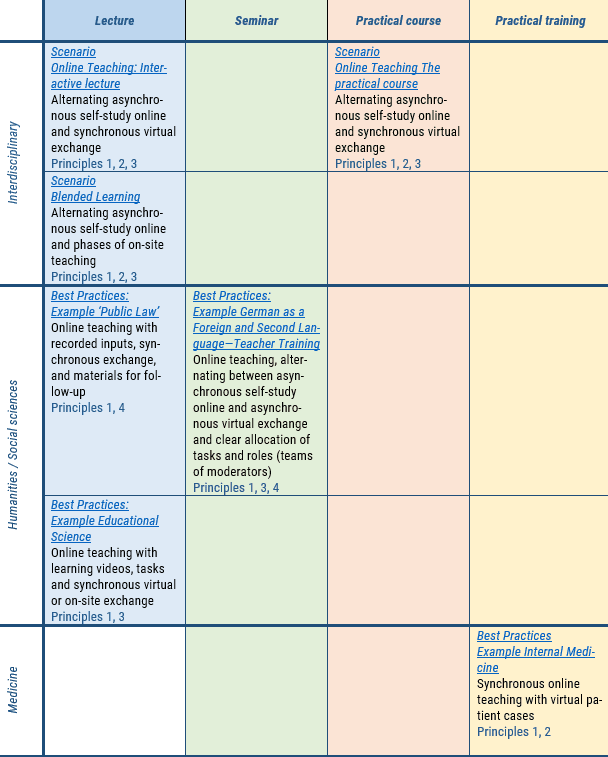
Principles of good teaching
In its Strategy Teaching, the University of Jena has committed itself to principles of good teaching. They are based on socially shared norms and values and were developed in an iterative, university-wide communication process. The iridescent "we" in these principles refers to all those who bear responsibility in different roles - e.g. as teachers, students, committee members - in and for teaching and learning. The principles of good teaching are complemented by the principles of good digital teaching, which address the special challenges in digital teaching and learning environments.
-
We are committed to the unity of research and teaching.
The Friedrich Schiller University sees research and teaching as equally important and interdependent components of science. Research orientation is the specific feature of university teaching. This means that good teaching conveys the current state of knowledge in research as well as the awareness that knowledge is dynamic. Teachers can gain important impulses for their research from lively discussions with students.
-
As teachers and students, we contribute cooperatively and with mutual respect to the success of teaching and learning.
Good teaching thrives on the commitment of both teachers and students and ideally leads to a mutual increase in knowledge. Teachers are required to provide high-quality learning opportunities in terms of subject matter and university didactics, to reflect on the success of their teaching and to continuously develop their courses. The students, for their part, contribute to the success of the teaching by taking responsibility and actively perceiving the teaching offered, studying with commitment and giving constructive feedback on it.
-
We aim our teaching at informed and critical reflection within and outside the science.
Good academic teaching not only imparts sound knowledge, but also develops a critical and reflective attitude in students. It guides students to evaluate scientific findings and to ask and clarify professional questions themselves. It enables students to establish connections between research results and professional problems. Students learn scientific ethical standards and take them into account in their studies and future professional positions.
-
We keep the university's holistic educational mission in mind in our teaching.
It is not enough to measure academic success solely in terms of acquired knowledge and examination results. Rather, the development of students' personalities, motivational, emotional and social competence facets as well as the responsible use of achieved knowledge and skills are also among the central goals of studying at the Friedrich Schiller University. Good teaching aims at active participation in democratic societies as well as the ability and willingness to always reorient oneself independently in the face of constantly changing challenges.
-
We face up to dealing with diversity in our teaching.
Non-discriminatory, accepting interaction among and between students and teachers is an indispensable prerequisite for successful learning. We emphasise the opportunities associated with diversity among students and teachers. We develop solutions for the resulting challenges in teaching. We take the diverse learning requirements of students into account when developing study programmes and teaching concepts.
-
We take into account the diversity of research cultures in our teaching.
Our research cultures are shaped very differently by numerous factors. This results not only in different research methods and different perspectives on the world, but also in the need to develop subject-specific concepts, forms of work and formats in teaching. We respect this diversity of approaches to subject-specific questions in teaching and advocate for the necessary framework conditions.
-
We offer interdisciplinary perspectives in our teaching.
Many scientific and socially relevant questions can only be solved within the framework of interdisciplinary cooperation. The prerequisite for this is openness and respect for other subject cultures as well as awareness of the limits of one's own subject perspectives. We exemplify this attitude in our teaching. At various levels and in various formats, the teachers offer students interdisciplinary learning opportunities.
-
We recognise and support engagement in teaching.
We are committed to creating a framework in which teaching can be carried out at a high level across the board. Special commitment, inventiveness and outstanding achievements in teaching are promoted, made visible and awarded at Friedrich Schiller University. We offer teachers the necessary scope for developing and implementing new ideas and concepts. When assessing academic performance, we consider both research and teaching as performance dimensions.
-
We are continuously developing teaching at our university.
Teaching can only become better and better if it is measured by the achievement of its goals. This requires suitable instruments to make learning outcomes and desiderata comprehensible. Corresponding findings are used by the subjects on their own responsibility for the further development of teaching. The Friedrich Schiller University therefore provides support structures for teaching evaluation and for qualification in higher education didactics and is constantly developing these further.
-
We maintain discourse about our teaching-related values.
The further development of teaching also touches on normative aspects. These include the questions of what is meant by good teaching, which minimum standards we do not want to fall below in teaching and which overarching values should guide teaching at the Friedrich Schiller University. For us, the discourse on these and similar questions is part of quality development. Teachers and students conduct it regularly and publicly in various formats.
Principles of good digital teaching
The University of Jena considers itself to be an institution offering face-to-face teaching. For this reason, face-to-face interaction and exchange on site are essential for academic learning. However, the digitalization of teaching in higher education is an ongoing and dynamic process. As students and teachers are gaining more experience with regard to digital teaching, its potential is becoming increasingly apparent. The principles of good teaching apply to digital learning formats. Since digital learning contexts create special challenges for teachers and students, the present document supplements those principles, placing a specific focus on digital learning.
-
Principle 1: Teachers ensure the quality of digital teaching and learning
Digital content supplements and complements the traditional formats of teaching and learning. Academic teaching can benefit from the use of digital resources if they are selected, modified and commented on by teachers. It is therefore mandatory for teachers to ensure the quality of digital teaching and learning offerings, to adapt them to the specific prerequisites and needs of the students as well as to the examination objectives, and to ensure compliance with the legal framework. This is why teachers remain indispensable in digital teaching and responsible for the design of teaching and learning opportunities.
-
Principle 2: Digital teaching is a social and communicative process
In digital teaching settings, the exchange between teachers and students as well as among students is always mediated by a virtual learning environment. The mediated nature of these interactions makes it particularly challenging to build social relationships. Digital teaching is to be understood as a social process and should be designed as such. Teachers foster student learning by continuously interacting with students in relevant phases of the learning process. They are to design accessible digital teaching formats that give all students the opportunity to communicate and collaborate with each other in relevant phases of the learning process.
-
Principle 3: Digital teaching tools are selected to achieve didactic objectives
The range of classical teaching and learning methods is constantly being supplemented by digital tools. However, the use of digital tools per se does not make for good teaching. As with traditional face-to-face formats, digital teaching and learning tools are developed with specific objectives and situational requirements in mind. Being clear about the objectives makes it possible to take a well-founded decision about where digital or analogue formats have particular potential in the teaching process and how they can be interlinked, if necessary. In this sense, digital teaching tools are an addition to the range of media and methods available and make it possible to coordinate learning objectives, teaching methods and performance assessment even better.
-
Principle 4: Digital teaching requires a special form of feedback culture
The lack of personal contact makes it difficult for teachers to provide students with immediate feedback on their learning processes and results. Especially in digital learning environments, it is important to provide students with targeted, regular and transparent feedback in order to give them orientation and allow them to adequately assess themselves. For feedback to promote learning, it has to be based on clear criteria and given during the learning process. In addition to feedback from teachers to students, forms of peer feedback (among students) and teaching evaluations (feedback from students to teachers) can also be used.
-
Principle 5: Digital formats of teaching and learning are used consciously
Digitalization is bringing about a rapid increase in freely accessible knowledge and new ways of imparting knowledge and of interaction between teachers and students, as well as among students. At the same time, there are limits in terms of time and cognitive processing that need to be taken into account in teaching and learning. This is why it is important to select and prioritize teaching content and to be aware of the limited nature of resources, especially when using digitally supported teaching and learning formats, to ensure that the workload for students and teachers is appropriate.
Exemplification of the Principles of Good Digital Teaching
Table: Overview_Exemplification of the principals of good digital teaching
Image: Academy for Teaching DevelopmentThe "Principles of Good Digital Teaching" are necessarily formulated abstract in the wording. The expert panel of the ALe has therefore compiled various proposals for concretisation and implementation. They are intended to serve as an inspiration for teachers to design their own digital or hybrid teaching programmes according to the "Principles of Good Digital Teaching". The concretisations will be updated according to developments in the field of digital teaching.
The following navigation will take you to the teaching scenarios and examples of best practice. Alternatively, both the "Principles of Good Digital Teaching" and the corresponding appendix document "On the concretisation of the Principles of Good Digital Teaching" are available as pdf versions in the download area.
- Scenario: interactive lecture
- Scenario Online Teaching: Exercise
- Scenario: Seminar with student's presentation
- Best Practices ‘Lecture’: Example Educational Science
- Best Practices ‘Lecture’: Example Public Law
- Best Practices 'Lecture': Example German as a Foreign or Second Language
- Best Practices ‘Practical training’: Example Internal Medicine
